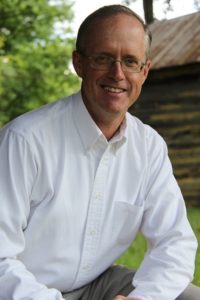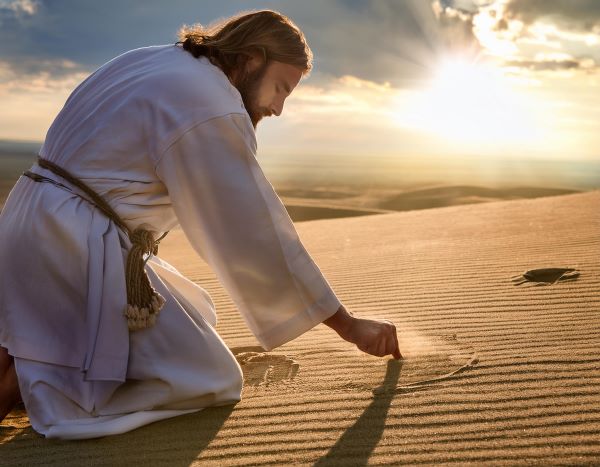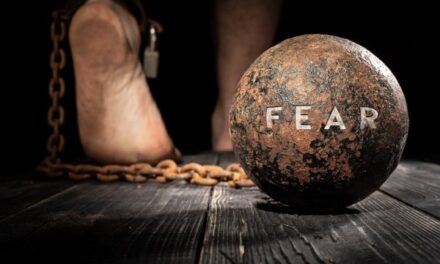Doodles in the Mind
By Tim Tron
Burke County
“ This they said, tempting him, that they might have to accuse him. But Jesus stooped down, and with his finger wrote on the ground, as though he heard them not. So when they continued asking him, he lifted up himself, and said unto them, He that is without sin among you, let him first cast a stone at her. And again he stooped down, and wrote on the ground.” – John 8: 6-8
As a child, the sounds beyond my bedroom before dawn always took on a life of their own. One such morning, when staying overnight with my maternal grandparents, I had been awakened in the darkest hour before daylight to the sound of someone moving around in another part of the house. My imagination soon began to fill in the gaps of “What could be” without knowing what really existed. For some reason, the combination of tinkling and rattling became someone rummaging through what sounded like the silverware drawer. Convinced someone had broken into our house and was stealing all our eating utensils, a dreadful fright began to overwhelm my being, but instead of a paralyzing fear, it became a discomfort so great that regardless of my well-being, it was necessary to investigate firsthand.
As silent as the morning mist over the summer’s pasture, the little, innocent child crept from his chamber with great trepidation. The darkness beyond the bedroom door seemed all the more daunting as the moonlight cast a blue-gray panorama of shadows into the humble living room of that tiny farmhouse. Into the pallid chasm, the little trembling frame crept, peering into the kitchen through the darkened archway.
Nothing. Nobody. Emptiness.
The mental aberration had vanished and now could be anywhere. There was only the gray shadows of a daunting silence – “Must return to my bed at once before it jumps out and kills me, whatever it is.” With great haste, I raced back to my bedroom. My grandparent’s door was slightly ajar. As I passed, it was more than comforting to hear the roar of my grandpa’s snoring. The image of his large, demanding frame came to mind, instantly dashing away the evil that had almost consumed my soul. Diving back into the safety of the still-warm covers, I was resolved not to let my ears deceive me ever again.
The irony of my ill-conceived predawn conjecture was that I have never known nor been a victim of any crime of theft. Up to that point, all my young life had been spent living in the vast countryside of southern Indiana, in the rural fields and forests surrounding New Harmony. There was seldom any crime to speak of in that day and time. So, for my thoughts to turn to someone or something breaking into my grandparent’s house was as ludicrous as it was scary. The void of knowing and not knowing had allowed my mind to fill in the blank with something that had no guidance nor direction – instead, the fears of a little boy’s imagination had found their place.
There again, in whatever adventure in life we have looked forward to, there has been some speculation on our part as to what we might find when reaching the destination. Our minds create all manner of imagery. And in so doing, how many times have you arrived at “that” place only to find your mind had done something much grander than what lay before you? What a deflating feeling. Or possibly, you had underimagined, causing the reaction, “Wow, this is more awesome than I could have ever imagined.” Whatever the case, reality rarely matches what our mind transposes upon the present.
“But Thomas, one of the twelve, called Didymus, was not with them when Jesus came. The other disciples therefore said unto him, We have seen the Lord. But he said unto them, Except I shall see in his hands the print of the nails, and put my finger into the print of the nails, and thrust my hand into his side, I will not believe. And after eight days again his disciples were within, and Thomas with them: then came Jesus, the doors being shut, and stood in the midst, and said, Peace be unto you. Then saith he to Thomas, Reach hither thy finger, and behold my hands; and reach hither thy hand, and thrust it into my side: and be not faithless, but believing. And Thomas answered and said unto him, My Lord and my God. Jesus saith unto him, Thomas, because thou hast seen me, thou hast believed: blessed are they that have not seen, and yet have believed.”[1]
Even when the scenes or visions are explained to us in detail, it’s almost impossible to grasp the full breadth of the imagery that the person may be trying to describe. In art, the use of vagueness helps to create the illusion of a multitude of leaves or blades of grass. To attempt to paint each one would be futile and confusing. Similarly, as an author describes a story, there are times when allusion, leaving out something that allows the reader to imagine on their own, becomes ever more powerful than if they had attempted to describe every detail of that which had been left to the imagination. Are these gaps in scripture’s definitions likewise God’s way of allowing our imaginations to run wild, or is it something more? I’d prefer to think the latter, for in this world, our imaginations often lead us down paths of inequity rather than paths of righteousness if left up to our human nature.
In the Gospel of John, we read about Jesus, the Son of Man, stooping before the Sages and Pharisees as if he wasn’t listening to their accusations of a woman that they had caught in the act of adultery. Knowing the law of Moses, they had an air-tight case. They would bring it before this man, the self-proclaimed Son of God, and see what crazy thing he might dream up to counter what they knew was an open and closed case. Their plan was to entrap him in his own words. Yet, as they spoke to the rebel preacher, after looking into their eyes with humbled compassion, a look that stirred something deep inside them, he stooped to the ground before them, head down, and began to draw something with his finger as though he wasn’t listening.
But, oh, how he was listening. Jesus knew the true intentions of their hearts.
To this day, the speculation about what Jesus wrote that morning on the ground before the accusers of a woman caught fornicating with another man, someone who was not her husband, remains a debate. However, my purpose for this piece is not to figure out what he wrote but rather to contemplate what our minds tend to do with those empty spaces that scripture allows. To not know what he wrote is as important as what we conceive of this action, and likewise, what those estranged legalists at that moment when Christ kneeled before them to make a point – something so significant, so revealing to each of them, that they dropped their charges. Which, in and of itself, was huge considering that there was no way they could lose in a court of law – for the witness of two or more was all that was necessary to convict someone in that time, which they had indeed obtained. Yet, they each walked out as if in shock, convicted of their own conscience.
In my mind’s eye, I see Jesus kneeling, and as one might doodle in the dirt as they collected their thoughts, I can see him doing likewise, not really drawing anything in particular. Watching with keen, condemning eyes, each one aware that they must have had some sort of impact for this renowned prophet not to respond immediately. It could be considered here at this moment that they had a possible couple of retracted expectations as they looked upon the ponderous attitude of Jesus – one of anger, the fact that he seemed to ignore them, or fear, realizing that if it were true, this was the Son of God, that what they were about to experience might threaten their very life.
Those who were angered by this act of disrespect, as if they were owed some sort of obligatory praise for their discovery, were suddenly taken aback at the irreverence of the man before them. His doodling, a pause in the moment, became a torment, a reason to wonder, “Why would he sit there doing that instead of giving us the attention we deserve!”. Could it have been that Jesus was actually contemplating the verse, “There is none righteous, no, not one: There is none that understandeth, there is none that seeketh after God. They are all gone out of the way, they are together become unprofitable; there is none that doeth good, not, not one. Their throat is an open sepulchre; with their tongues they have used deceit; the poison of asps is under their lips: Whose mouth is full of cursing and bitterness: Their feet are swift to shed blood: Destruction and misery are in their ways: And the way of peace have they not known: There is no fear of God before their eyes.”
It was obvious that his silence spoke louder than words. In the still of that instantaneous moment, they, each one of them singularly, stood before a kneeling God, naked, the insignificant before the infinite, baring their intentional deceit and equivocally realizing the ignorance of their actions when compared to the presence of the Holy Father. Like a spiritual X-ray, they could see in the reflection of his pause their own ignorance and infinitesimally pettiness. But when he stood and said, “If there be any one of you without sin, let him cast the first stone,” and returned to the ground, continuing to draw with that same finger, the one that could have easily pointed at each one of them – the finger of condemnation. Instead, it pointed toward the earth, where each man returns to in his sin.
The statement, from Christ, rising to address them to the return to the position of submission, their thoughts a whirlwind of self-condemnation and guilt, for in the momentary halting of time, each mind went to why they were there and to their own inequities. But to see the Son of God rise, as the morning sun standing from the horizon, each soul guilty of worse things in their own life, because each had tried to cover their faults, their based life of lies, each no less guilty than the woman that they had discovered in the brutal, senseless act of the flesh. There was no more hiding. Their thoughts had been redirected, but not of their own accord, but by the hand of God.
Each of us has an innate desire to turn the predawn darkness into something darker, more evil than we want – for this thing we do, that which we do not want. It is by our very nature that we are predisposed to such actions. It is in the presence of the Holy Spirit that we can become healed of ourselves, turned from our past, facing the convictions that are the sign of receiving Him into our lives. It is only then that we can begin to heal from our base, barbaric beings with which the world wants each to become one.
We can become angered by this control, or we can fear it – it is up to each of us how we perceive God’s direction for our lives. Ignorance and innocence are often coupled, as are pride and corruptible natures that lead to anger for something beyond their grasp. The desire to control every aspect of one’s life is as sinful as fornication outside of marriage in the eyes of God – for all sin is equal in the mind of God. When we give in, to have a contrite heart, it is then we kneel before the Father, submitting our control over to His will, not our own.
Those thoughts of a child are as a child, innocent and unknowing. When we realize we are no longer children but grown beings responsible for our actions, we must consider the direction in which our lives are headed. The random scratching in the dirt by Our Lord, our Father, oh how my heart would have loved to have seen them, for in their meaningless image within the dust of the earth of which he created us, his hand once more drew for us a path of life, to have the opportunity to be with him in eternity should we recognize that pattern in the dirt that is revealed to us, should we accept it.
These are just some of the thoughts that the often perceived vacuum of scripture sometimes allows—although there is never any void, for its purpose is intentional. I hope that in them, you, too, consider the possibility of what God is saying in your life. As those ancient accusers become convicted and seek that path from the dirt to the heavens, we have one life to live, and where it ends is a choice we all have to make.
Make your choice today, choose wisely, and be sure to kneel once in a while and draw something in the dirt with your finger for those around you to see and contemplate.
Thanks be to God.
[1] John 20:24-29 KJV
_____________________________________
Timothy W. Tron lives in Collettsville, NC. with his family. He is currently the Systems Administrator for the Computer Science Department at App. State. Timothy is the former Director of the Trail of Faith in Valdese, where he still volunteers and helps with tours. He is the author of a new Christian series, “Children of the Light”, with the first book being, “Bruecke to Heaven”, revised as “Bridge to Heaven”, and his recent book, being the second, “The Light in the Darkness”. He is an active blogger, artist, and musician. Timothy also has a BSEE from UF, and is a Lay Speaker. He is currently acting as the Faculty/Staff Liaison for the Ratio Christi campus ministry at App. State. He can be reached at trontw@appstate.edu You can visit his website at //www.timothywtron.com/ or see more of his writings HERE
_____________________________________







